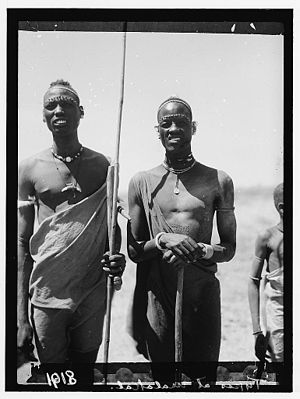Shilluk people

Two Shilluk men, photographed 1936 near Malakal, South Sudan
|
|
| Total population | |
|---|---|
| (Approximately ~ 1,500,000 (2005)) | |
| Languages | |
| Dhøg Cøllø | |
| Religion | |
| Christianity African traditional religion |
|
| Related ethnic groups | |
| Other Luo peoples, other Nilotic peoples |
The Shilluk (Shill: Chollo) are a major Luo Nilotic people of Southern Sudan, living on both banks of the river Nile, in the vicinity of the city of Malakal. Before the second Sudanese civil war the Shilluk also lived in a number of settlements on the northern bank of the Sobat River, close to where the Sobat joins the Nile, with Doleib Hill as an important mission station. Doleib Hill mission has ceased after Nuer armed militia Jiech Mabor and Dr. Riek Machar's rebels stormed Doleib and burned Shilluk villages, and looted Shilluk (Chollo) community properties in 1987, 1997, 2013 and 2014 (by Dr. Riek Machar's rebels).
The Shilluk are the third largest ethnic group of Southern Sudan, after the Dinka and their neighbours the Nuer.
Their language is called Dhøg Cøllø; dhøg being the Shilluk word for language and mouth. It belongs to the Luo branch of the Western Nilotic subfamily of Nilo-Saharan.
The shilluk and the Anuak are the closest related members of the Luo Nilotic groups, many of the words in the shilluk language are made up of words from dha anywaa or the Anuak language. Historically, the Shilluk were led by a king Reth who is considered to be from the divine lineage of the culture hero Nyikang, and whose health is believed to affect that of the nation. Formerly, their society was fairly hierarchical, with castes of royals, nobles, commoners, and slaves. Like most Nilotic groups, cattle-raising formed a large part of their economy; however, agriculture and fishing were more significant than usual, and most were sedentary. The Shilluk people created the Shilluk Kingdom which existed in Southern Sudan since (1454 to Present).
...
Wikipedia
